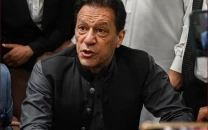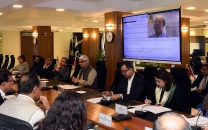Judges, AGP weigh merits of ‘full court’
Apex court orders top law officer to submit parliament’s record
1683543433-0/mix-(4)1683543433-0-640x480.webp)
Grilling the state’s top law officer over his request to form a full court, the top court has once again ordered Attorney General for Pakistan (AGP) Mansoor Awan to submit the record of parliament and a standing committee with regard to the Supreme Court (Practice and Procedure) Act, 2023.
An eight-judge larger bench of the Supreme Court on Monday resumed hearing of the petitions filed against the piece of legislation that seeks to ‘regulate’ powers of the chief justice of Pakistan (CJP) with regard to forming benches and initiating suo motu proceedings.
AGP Awan told the bench led by CJP Umar Ata Bandial that the federal government has submitted an application for the formation of full court to hear the petitions. The counsel for the Pakistan Muslim League-Nawaz (PML-N) said the party has also moved an application for forming a full court.
The SC bench on May 2 also sought record of the parliament’s proceedings with regard to the Supreme Court (Practice and Procedure) Act 2023. Taking up some petitions filed against the bill, the SC on April 13 stopped the enforcement of the bill in what was described by some as a preemptive move.
Read Will CJP’s dinner heal SC divisions?
However, despite the SC’s order, the bill became a law on April 22 as the National Assembly Secretariat formally asked the Printing Corporation of Pakistan (PCP) to publish it in the official gazette.
In his arguments on Monday, the AGP said the law deals with formation of benches and the right to appeal in suo motu cases. He said the law deals with matters which are administrative in nature.
“The Supreme Court rules were approved by a full court and only a full court can amend these rules.
“A case related to independence of judiciary and the SC rules should also be heard by a full court as the law will also be applicable to the SC judges who are not part of this bench,” he said.
Justice Ijazul Ahsan remarked that the question is about the parliament’s power to legislate in this matter and not about amending the SC rules. “Different SC benches have been regularly hearing cases related to [a legislature’s] power to make laws,” he said.
Justice Sayyed Mazahar Ali Akbar Naqvi asked if the parliament had ever made such a law. “How can such legislation take place despite Article 91 [of the Constitution}?” he said.
The AGP conceded that the case is unique in its nature and “that is why it is necessary to form a full-court to hear this matter.”
Justice Ayesha Malik observed that the cases that are the first of their kind often land in courts and any bench of the apex court can hear any case. “Does the government want to take advantage of a full court? Does the government want to highlight the court’s internal differences?”
She said every case is important. “Then how can it be determined which case should be heard by a full court and which by regular benches? Has every case related to independence of the judiciary been heard by a full court in the past?”
The AGP agreed that all cases related to independence of judiciary have not been heard by a full court.
The CJP remarked that apparently the case does not warrant formation of a full-court.
Justice Ayesha Malik asked if the government wanted to imply that people only trusted a full court. “How can the court regulate its proceedings on the wishes of petitioners?”
Justice Shahid Waheed asked if the bench was supposed to order the CJP to form a full-court.
Justice Munib Akhtar said a full court is entitled to make rules related to administrative matters. “What if a petition with regard to interpreting some rules is listed before a three-judge bench? Should this matter be also heard by a full-court? The full court has made the rules.”
The AGP said the petitioners have challenged the parliament’s power to legislate in this matter.
Justice Ayesha Malik said the logic of the AGP is unsound. “Verdict passed by a full-court is good but a verdict passed by a three-judge bench is not good.”
Justice Munib Akhtar said the parliament has given an answer to the question of forming a full court in the Supreme Court Practices and Procedure Act, 2023. “The law says a five-judge bench of the apex court will hear matters related to interpretation of the Constitution.”
The AGP said the court has suspended implementation of the law. Justice Akhtar asked if the government still sought formation of a full-court if the court had not suspended the law.
“The parliament says there should be a five-judge bench; the AGP says there should be a full court. It seems the government is weak in math. Can you tell us how many judges are hearing this case?”
The AGP said a request can be made for formation of a full-court. “The law says there should be at least 5 judges on the bench hearing such cases.”
When Justice Akhtar asked the AGP whether the parliament allows having a five-judge bench to hear cases related to interpretation of the Constitution, the AGP replied in the affirmative.
Justice Ayesha Malik said courts regularly hear petitions filed against pieces of legislation. Even high courts, she said, hear such matters.
“Has the government ever asked any high court to form a full court to hear such petitions? Will 60 judges of the Lahore High Court (LHC) and 40 judges of the Sindh High Court (SHC) hear such cases?”
Justice Munib Akhtar repeated Justice Malik’s question if the LHC and the SHC would respectively form 60- and 40-judge benches to hear petitions against pieces of legislation.
The AGP said the Supreme Court Practices and Procedure Act, 2023 has not been challenged in a high court and therefore he would not answer that question. Justice Ijazul Ahsan said if the SC formed a full-court to hear the case the high courts will also have to form full courts to hear such matters.
The CJP said the SC formed full courts while hearing appeals against presidential references filed against former CJP Iftikhar Chaudhry and SC senior judge Qazi Faez Isa.
“Full courts were formed in view of the seriousness of the matter. In both the cases, the full courts dismissed the presidential references. Did the SC form a full court to hear any other case?”
After hearing arguments of the AGP and the counsel for the PML-N, the CJP ordered the AGP to present the record of the parliament and the relevant standing committee with regard to the law. He adjourned the case for an indefinite period in view of the unavailability of a bench member in coming weeks.



















COMMENTS
Comments are moderated and generally will be posted if they are on-topic and not abusive.
For more information, please see our Comments FAQ